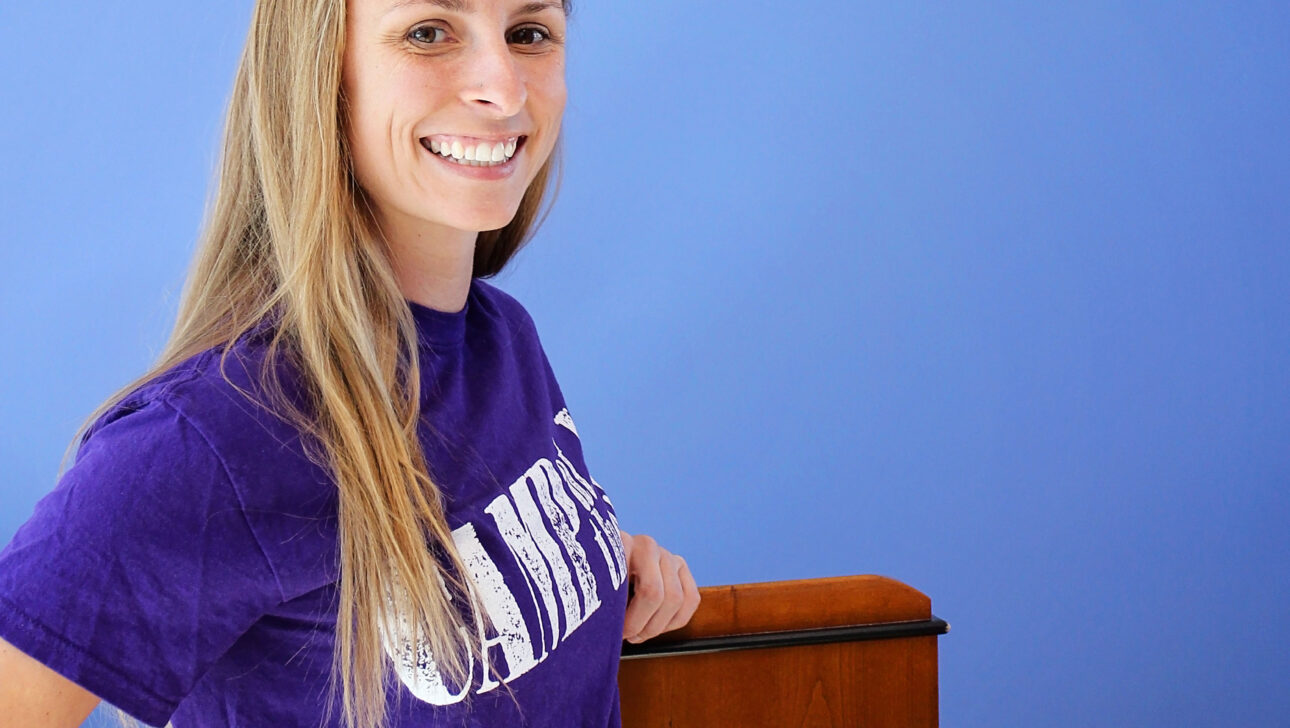By Nikki Downey, Director of Camp at the J
Certainly for my life, and I’m sure for many others, the experiences we have at camp carry a life-long impression. Songs learned, games played, skills obtained and talents honed at camp we remember forever and often pass these on to others later in our journey. While I believe that a good summer camp experience has innumerable rewards for youth and adult participants, I’ll attempt to narrow down to 5 reasons that kids benefit the most from attending camp:
1. Camp Improves Confidence – It was a balmy night in the Ozark Mountains as I was running with a spoon in my mouth holding a marshmallow on the end. We were jumping through hoops and over pools of chocolate pudding making sure this marshmallow did not fall! I could feel the adrenaline rushing through my body as I was concentrating on the course ahead. I could hear my group and counselors cheering my name. The counselors were encouraging, and it helped my confidence as I ran. I am not the most competitive person, but when it comes to playing with a team I want to make sure our team wins! I learned to play sports and games at camp, and hearing my counselors yell out “Go Nikki!” or “good job!” made me feel like I was making a difference to help our team win the game.
2. Camp Opens Us To New Experiences – Anytime I’m near a freshwater lake the smell brings me to the first time I got to try Water Skiing at camp. It was hard for me to stay upright but I eventually did it and I had so much fun! Camp provides a forum for campers to try all kinds of new things, whether it’s a sport they can’t practice in their backyard, like tennis or archery, or something more daring, like a high ropes course. Camp offers a variety of activities for campers to try, and hopefully they learn a new skill they can take home and possibly focus on that sport or skill in school or at the neighborhood recreation center. Many of the younger campers have not fully learned to swim and often start the camp season using a lifejacket; however by the end of the summer most of the ones who began with a lifejacket are swimming better and even jumping off of the diving boards.
3. Friendships Are Built at Camp– Kids have a good time and continue coming to camp when they make friends. My goal as a camp director is to make sure kids are never lonely at camp. I love hearing on Monday mornings that some of the campers got together over the weekend to play. Pre-teens and teens can be challenging groups in encouraging friendships. You can’t force them to be friends with each other, but you can make sure they have a good time together and take home fun stories to share with their parents. In Missouri, there was a resident camp I attended for 10 years; kids from all over America would attend for a week at a time. I built relationships with people from the Cincinnati area and also made friends with people from around America, who I’ve kept in contact with throughout the years. Recently with social media, I have found many of my camp friends online and am updated daily of their lives. This is why camp is an important part of a child’s life, sure they play games, learn to swim and lose their voices from cheer battles, but they also develop lifelong relationships.
4. Camp Involves Physical Activity– When I picture camp in my head, I see painted faces, cheers, smiles, and campers and counselors running around being active. At camp everyone should always be active playing games and all counselors should be engaged with campers. I like when we can sneak in exercise components into our camp games without the campers realizing they are increasing their heart rate and building muscle. I like to train staff to play games where no one gets out. For example, if you’re playing kick ball think about the one position everyone fights to be…the pitcher. Why? Because that person is active the entire game. But if you play kickball without a pitcher, it changes the game. Let all kickers kick or throw their own ball, this allows for campers who don’t feel confident in kicking participate. Once outfield retrieves the ball, make sure all participants touch the ball before they yell “STOP” to the other team. This can be done however the team decides. Meanwhile, the ENTIRE kicking team is running around two bases, or three bases and everyone is making a point for the team until they hear “STOP”. The focus isn’t on the one kid who doesn’t run very fast, or the one kid who is the fastest runner. Even campers who use wheelchairs or walkers can participate with extra or no assistance from a counselor. The point is that everyone is engaged in the game, everyone gets to use the equipment and everyone is active.
5. Camp Encourages Kids to Find Positive Role Models and Learn to Become Role Models– “Who wants to be famous?” That’s what I was asked during my camp training and that’s the first thing I ask when I train camp staff. Most people want recognition or to be known for something, so many counselors raise their hands. Then I congratulate them on being the most popular people this summer. Campers are going to look up to them, and watch their every move. They are going to form a unique bond with the campers that the campers don’t have with their other influences like parents or teachers. Campers may even see counselors outside of camp at the mall or the park and see who they are when they aren’t at camp. Being a camp counselor has a lot of pressure in that sense. But it’s all good, it’s all good pressure. I let them know that now they can relate their life to one of a gold fish in a bowl. There is glass all around their life and everyone can see. It encourages them to make the right decisions. If they see a counselor participating in games, or helping someone carry their belongings, or saying thank you, campers are going to want to do those same gestures. Not only do campers get to look up to role models, but they also get to learn how to become a good role model. As they grow in camp they become the role models for the younger kids, and eventually become a Counselor-In-Training (CIT) and hopefully, in turn, become a counselor.
Camp offers the time and safe place for campers to test their limits and overcome their fears. When a camper gets in the car at the end of the day and the first thing I hear mom comment on is how sweaty and smelly their camper is, I know that we did our job that day! That camper had fun with friends and was engaged in physical activity. I smile at mom and tell her, “Tonight should be a good sleep!”.

